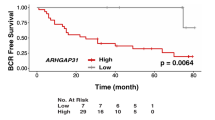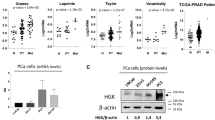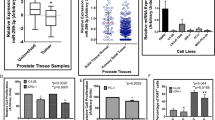Abstract
Prostate cancer (PCa) is a common cancer in men. Although current treatments effectively palliate symptoms and prolong life, the metastatic PCa remains incurable. It is important to find biomarkers and targets to improve metastatic PCa diagnosis and treatment. Here we report a novel correlation between karyopherin α4 (KPNA4) and PCa pathological stages. KPNA4 mediates the cytoplasm-to-nucleus translocation of transcription factors, including nuclear factor kappa B, although its role in PCa was largely unknown. We find that knockdown of KPNA4 reduces cell migration in multiple PCa cell lines, suggesting a role of KPNA4 in PCa progression. Indeed, stable knockdown of KPNA4 significantly reduces PCa invasion and distant metastasis in mouse models. Functionally, KPNA4 alters tumor microenvironment in terms of macrophage polarization and osteoclastogenesis by modulating tumor necrosis factor (TNF)-α and -β. Further, KPNA4 is proved as a direct target of miR-708, a tumor-suppressive microRNA. We disclose the role of miR-708-KPNA4-TNF axes in PCa metastasis and KPNA4’s potential as a novel biomarker for PCa metastasis.
This is a preview of subscription content, access via your institution
Access options
Subscribe to this journal
Receive 50 print issues and online access
$259.00 per year
only $5.18 per issue
Buy this article
- Purchase on Springer Link
- Instant access to full article PDF
Prices may be subject to local taxes which are calculated during checkout







Similar content being viewed by others
References
Lu X, Mu E, Wei Y, Riethdorf S, Yang Q, Yuan M et al. VCAM-1 promotes osteolytic expansion of indolent bone micrometastasis of breast cancer by engaging alpha4beta1-positive osteoclast progenitors. Cancer Cell 2011; 20: 701–714.
Zitvogel L, Kepp O, Galluzzi L, Kroemer G . Inflammasomes in carcinogenesis and anticancer immune responses. Nat Immunol 2012; 13: 343–351.
Brenner D, Blaser H, Mak TW . Regulation of tumour necrosis factor signalling: live or let die. Nat Rev Immunol 2015; 15: 362–374.
Hu X, Li B, Li X, Zhao X, Wan L, Lin G et al. Transmembrane TNF-alpha promotes suppressive activities of myeloid-derived suppressor cells via TNFR2. J Immunol 2014; 192: 1320–1331.
Wu Y, Zhou BP . TNF-alpha/NF-kappaB/Snail pathway in cancer cell migration and invasion. Br J Cancer 2010; 102: 639–644.
Bertrand F, Rochotte J, Colacios C, Montfort A, Tilkin-Mariame AF, Touriol C et al. Blocking tumor necrosis factor alpha enhances CD8 T cell-dependent immunity in experimental melanoma. Cancer Res 2015; 75: 2619–2628.
Popivanova BK, Kitamura K, Wu Y, Kondo T, Kagaya T, Kaneko S et al. Blocking TNF-alpha in mice reduces colorectal carcinogenesis associated with chronic colitis. J Clin Invest 2008; 118: 560–570.
Finisguerra V, Di Conza G, Di Matteo M, Serneels J, Costa S, Thompson AA et al. MET is required for the recruitment of anti-tumoural neutrophils. Nature 2015; 522: 349–353.
Hsu DS, Wang HJ, Tai SK, Chou CH, Hsieh CH, Chiu PH et al. Acetylation of snail modulates the cytokinome of cancer cells to enhance the recruitment of macrophages. Cancer Cell 2014; 26: 534–548.
Ostuni R, Kratochvill F, Murray PJ, Natoli G . Macrophages and cancer: from mechanisms to therapeutic implications. Trends Immunol 2015; 36: 229–239.
Luo Y, Zhou H, Krueger J, Kaplan C, Lee SH, Dolman C et al. Targeting tumor-associated macrophages as a novel strategy against breast cancer. J Clin Invest 2006; 116: 2132–2141.
Adams DL, Martin SS, Alpaugh RK, Charpentier M, Tsai S, Bergan RC et al. Circulating giant macrophages as a potential biomarker of solid tumors. Proc Natl Acad Sci USA 2014; 111: 3514–3519.
Fang LY, Izumi K, Lai KP, Liang L, Li L, Miyamoto H et al. Infiltrating macrophages promote prostate tumorigenesis via modulating androgen receptor-mediated CCL4-STAT3 signaling. Cancer Res 2013; 73: 5633–5646.
Biswas SK, Mantovani A . Macrophage plasticity and interaction with lymphocyte subsets: cancer as a paradigm. Nat Immunol 2010; 11: 889–896.
Chen PC, Cheng HC, Wang J, Wang SW, Tai HC, Lin CW et al. Prostate cancer-derived CCN3 induces M2 macrophage infiltration and contributes to angiogenesis in prostate cancer microenvironment. Oncotarget 2014; 5: 1595–1608.
Zhang X, Tian W, Cai X, Wang X, Dang W, Tang H et al. Hydrazinocurcumin Encapsuled nanoparticles ‘re-educate’ tumor-associated macrophages and exhibit anti-tumor effects on breast cancer following STAT3 suppression. PloS One 2013; 8: e65896.
Yang J, Zhang Z, Chen C, Liu Y, Si Q, Chuang TH et al. MicroRNA-19a-3p inhibits breast cancer progression and metastasis by inducing macrophage polarization through downregulated expression of Fra-1 proto-oncogene. Oncogene 2014; 33: 3014–3023.
Fagerlund R, Kinnunen L, Kohler M, Julkunen I, Melen K . NF-{kappa}B is transported into the nucleus by importin {alpha}3 and importin {alpha}4. J Biol Chem 2005; 280: 15942–15951.
Agrawal T, Gupta GK, Agrawal DK . Calcitriol decreases expression of importin alpha3 and attenuates RelA translocation in human bronchial smooth muscle cells. J Clin Immunol 2012; 32: 1093–1103.
Mak P, Li J, Samanta S, Mercurio AM . ERbeta regulation of NF-kB activation in prostate cancer is mediated by HIF-1. Oncotarget 2015; 6: 40247–40254.
Jin R, Yi Y, Yull FE, Blackwell TS, Clark PE, Koyama T et al. NF-kappaB gene signature predicts prostate cancer progression. Cancer Res 2014; 74: 2763–2772.
Sachan N, Mishra AK, Mutsuddi M, Mukherjee A . The Drosophila importin-alpha3 is required for nuclear import of notch in vivo and it displays synergistic effects with notch receptor on cell proliferation. PloS One 2013; 8: e68247.
Abravanel DL, Belka GK, Pan TC, Pant DK, Collins MA, Sterner CJ et al. Notch promotes recurrence of dormant tumor cells following HER2/neu-targeted therapy. J Clin Invest 2015; 125: 2484–2496.
Yen WC, Fischer MM, Axelrod F, Bond C, Cain J, Cancilla B et al. Targeting notch signaling with a notch2/notch3 antagonist (tarextumab) inhibits tumor growth and decreases tumor-initiating cell frequency. Clinical Cancer Res 2015; 21: 2084–2095.
Ahluwalia A, Jones MK, Tarnawski AS . Key role of endothelial importin-alpha in VEGF expression and gastric angiogenesis: novel insight into aging gastropathy. Am J Physiol Gastrointest Liver Physiol 2014; 306: G338–G345.
Wang H, Tao T, Yan W, Feng Y, Wang Y, Cai J et al. Upregulation of miR-181s reverses mesenchymal transition by targeting KPNA4 in glioblastoma. Sci Rep 2015; 5: 13072.
Liang J, Li X, Li Y, Wei J, Daniels G, Zhong X et al. LEF1 targeting EMT in prostate cancer invasion is mediated by miR-181a. Am J Cancer Res 2015; 5: 1124–1132.
Lin S, Gregory RI . MicroRNA biogenesis pathways in cancer. Nat Rev Cancer 2015; 15: 321–333.
Yang J, Wei J, Wu Y, Wang Z, Guo Y, Lee P et al. Metformin induces ER stress-dependent apoptosis through miR-708-5p/NNAT pathway in prostate cancer. Oncogenesis 2015; 4: e158.
Kasinski AL, Slack FJ . Epigenetics and genetics. MicroRNAs en route to the clinic: progress in validating and targeting microRNAs for cancer therapy. Nat Rev Cancer 2011; 11: 849–864.
Saini S, Majid S, Shahryari V, Arora S, Yamamura S, Chang I et al. miRNA-708 control of CD44(+) prostate cancer-initiating cells. Cancer Res 2012; 72: 3618–3630.
Ryu S, McDonnell K, Choi H, Gao D, Hahn M, Joshi N et al. Suppression of miRNA-708 by polycomb group promotes metastases by calcium-induced cell migration. Cancer Cell 2013; 23: 63–76.
Lin KT, Yeh YM, Chuang CM, Yang SY, Chang JW, Sun SP et al. Glucocorticoids mediate induction of microRNA-708 to suppress ovarian cancer metastasis through targeting Rap1B. Nat Commun 2015; 6: 5917.
Jin R, Yamashita H, Yu X, Wang J, Franco OE, Wang Y et al. Inhibition of NF-kappa B signaling restores responsiveness of castrate-resistant prostate cancer cells to anti-androgen treatment by decreasing androgen receptor-variant expression. Oncogene 2015; 34: 3700–3710.
Lamb LE, Zarif JC, Miranti CK . The androgen receptor induces integrin alpha6beta1 to promote prostate tumor cell survival via NF-kappaB and Bcl-xL Independently of PI3K signaling. Cancer Res 2011; 71: 2739–2749.
Nadiminty N, Lou W, Sun M, Chen J, Yue J, Kung HJ et al. Aberrant activation of the androgen receptor by NF-kappaB2/p52 in prostate cancer cells. Cancer Res 2010; 70: 3309–3319.
Ammirante M, Luo JL, Grivennikov S, Nedospasov S, Karin M . B-cell-derived lymphotoxin promotes castration-resistant prostate cancer. Nature 2010; 464: 302–305.
Gerondakis S, Fulford TS, Messina NL, Grumont RJ . NF-kappaB control of T cell development. Nat Immunol 2014; 15: 15–25.
Lam J, Takeshita S, Barker JE, Kanagawa O, Ross FP, Teitelbaum SL . TNF-alpha induces osteoclastogenesis by direct stimulation of macrophages exposed to permissive levels of RANK ligand. J Clin Invest 2000; 106: 1481–1488.
Kobayashi K, Takahashi N, Jimi E, Udagawa N, Takami M, Kotake S et al. Tumor necrosis factor alpha stimulates osteoclast differentiation by a mechanism independent of the ODF/RANKL-RANK interaction. J Exp Med 2000; 191: 275–286.
Li X, Loberg R, Liao J, Ying C, Snyder LA, Pienta KJ et al. A destructive cascade mediated by CCL2 facilitates prostate cancer growth in bone. Cancer Res 2009; 69: 1685–1692.
Schneider A, Kalikin LM, Mattos AC, Keller ET, Allen MJ, Pienta KJ et al. Bone turnover mediates preferential localization of prostate cancer in the skeleton. Endocrinology 2005; 146: 1727–1736.
Li X, Yao W, Yuan Y, Chen P, Li B, Li J et al. Targeting of tumour-infiltrating macrophages via CCL2/CCR2 signalling as a therapeutic strategy against hepatocellular carcinoma. Gut 2015, epub ahead 9 October 2015 doi:10.1136/gutjnl-2015-310514.
Siegel RL, Miller KD, Jemal A . Cancer statistics, 2016. CA Cancer J Clin 2016; 66: 7–30.
Feng FY, Kothari V . Driven to metastasize: Kinases as potential therapeutic targets in prostate cancer. Proc Natl Acad Sci USA 2016; 113: 473–475.
Mortezavi A, Hermanns T, Seifert HH, Baumgartner MK, Provenzano M, Sulser T et al. KPNA2 expression is an independent adverse predictor of biochemical recurrence after radical prostatectomy. Clin Cancer Res 2011; 17: 1111–1121.
Ikenberg K, Valtcheva N, Brandt S, Zhong Q, Wong CE, Noske A et al. KPNA2 is overexpressed in human and mouse endometrial cancers and promotes cellular proliferation. J Pathol 2014; 234: 239–252.
Rachidi SM, Qin T, Sun S, Zheng WJ, Li Z . Molecular profiling of multiple human cancers defines an inflammatory cancer-associated molecular pattern and uncovers KPNA2 as a uniform poor prognostic cancer marker. PloS One 2013; 8: e57911.
Sakai M, Sohda M, Miyazaki T, Suzuki S, Sano A, Tanaka N et al. Significance of karyopherin-{alpha} 2 (KPNA2) expression in esophageal squamous cell carcinoma. Anticancer Res 2010; 30: 851–856.
Xu A, Sun S . Genomic profiling screens small molecules of metastatic prostate carcinoma. Oncology Lett 2015; 10: 1402–1408.
Theiss AL, Jenkins AK, Okoro NI, Klapproth JM, Merlin D, Sitaraman SV . Prohibitin inhibits tumor necrosis factor alpha-induced nuclear factor-kappa B nuclear translocation via the novel mechanism of decreasing importin alpha3 expression. Mol Biol Cell 2009; 20: 4412–4423.
Zadran S, Remacle F, Levine RD . miRNA and mRNA cancer signatures determined by analysis of expression levels in large cohorts of patients. Proc Natl Acad Sci USA 2013; 110: 19160–19165.
Fournier PG, Juarez P, Jiang G, Clines GA, Niewolna M, Kim HS et al. The TGF-beta Signaling Regulator PMEPA1 Suppresses Prostate Cancer Metastases to Bone. Cancer Cell 2015; 27: 809–821.
Kulbe H, Thompson R, Wilson JL, Robinson S, Hagemann T, Fatah R et al. The inflammatory cytokine tumor necrosis factor-alpha generates an autocrine tumor-promoting network in epithelial ovarian cancer cells. Cancer Res 2007; 67: 585–592.
Stathopoulos GT, Kollintza A, Moschos C, Psallidas I, Sherrill TP, Pitsinos EN et al. Tumor necrosis factor-alpha promotes malignant pleural effusion. Cancer Res 2007; 67: 9825–9834.
Zins K, Abraham D, Sioud M, Aharinejad S . Colon cancer cell-derived tumor necrosis factor-alpha mediates the tumor growth-promoting response in macrophages by up-regulating the colony-stimulating factor-1 pathway. Cancer Res 2007; 67: 1038–1045.
Hagemann T, Robinson SC, Schulz M, Trumper L, Balkwill FR, Binder C . Enhanced invasiveness of breast cancer cell lines upon co-cultivation with macrophages is due to TNF-alpha dependent up-regulation of matrix metalloproteases. Carcinogenesis 2004; 25: 1543–1549.
Hagemann T, Wilson J, Burke F, Kulbe H, Li NF, Pluddemann A et al. Ovarian cancer cells polarize macrophages toward a tumor-associated phenotype. J Immunol 2006; 176: 5023–5032.
Balkwill F, Charles KA, Mantovani A . Smoldering and polarized inflammation in the initiation and promotion of malignant disease. Cancer Cell 2005; 7: 211–217.
Gordon S . Alternative activation of macrophages. Nat Rev Immunol 2003; 3: 23–35.
Balkwill F . Tumor necrosis factor or tumor promoting factor? Cytokine Growth Fact Rev 2002; 13: 135–141.
Krzeszinski JY, Wei W, Huynh H, Jin Z, Wang X, Chang TC et al. miR-34a blocks osteoporosis and bone metastasis by inhibiting osteoclastogenesis and Tgif2. Nature 2014; 512: 431–435.
Gartrell BA, Saad F . Managing bone metastases and reducing skeletal related events in prostate cancer. Nat Rev Clin Oncol 2014; 11: 335–345.
Guise TA . Molecular mechanisms of osteolytic bone metastases. Cancer 2000; 88: 2892–2898.
Jin JK, Tien PC, Cheng CJ, Song JH, Huang C, Lin SH et al. Talin1 phosphorylation activates beta1 integrins: a novel mechanism to promote prostate cancer bone metastasis. Oncogene 2015; 34: 1811–1821.
Lee YC, Jin JK, Cheng CJ, Huang CF, Song JH, Huang M et al. Targeting constitutively activated beta1 integrins inhibits prostate cancer metastasis. Mol Cancer Res 2013; 11: 405–417.
Acknowledgements
This work was supported by NIH grants R01CA180277 and R03CA172894 to Xin Li, and in part by the NYU CTSA grant numbers 1UL1TR001445, 1KL2TR001446 and 1TL1TR001447 from the National Center for Advancing Translational Sciences (NCATS), National Institutes of Health. We thank Dr Deepak Saxena (New York University, New York, NY, USA) for the proofreading.
Author information
Authors and Affiliations
Corresponding author
Ethics declarations
Competing interests
The authors declare no conflict of interest.
Additional information
Supplementary Information accompanies this paper on the Oncogene website
Supplementary information
Rights and permissions
About this article
Cite this article
Yang, J., Lu, C., Wei, J. et al. Inhibition of KPNA4 attenuates prostate cancer metastasis. Oncogene 36, 2868–2878 (2017). https://doi.org/10.1038/onc.2016.440
Received:
Revised:
Accepted:
Published:
Issue Date:
DOI: https://doi.org/10.1038/onc.2016.440
This article is cited by
-
Long noncoding RNA SNHG14 knockdown exerts a neuroprotective role in MPP+-induced Parkinson’s disease cell model through mediating miR-135b-5p/KPNA4 axis
Metabolic Brain Disease (2022)
-
Ginsenoside Rg3 inhibits osteosarcoma progression by reducing circ_0003074 expression in a miR-516b-5p/KPNA4-dependent manner
Journal of Orthopaedic Surgery and Research (2021)
-
Genome-wide association studies identify 137 genetic loci for DNA methylation biomarkers of aging
Genome Biology (2021)
-
LncRNA ST7-AS1, by regulating miR-181b-5p/KPNA4 axis, promotes the malignancy of lung adenocarcinoma
Cancer Cell International (2020)
-
Disease-specific alteration of karyopherin-α subtype establishes feed-forward oncogenic signaling in head and neck squamous cell carcinoma
Oncogene (2020)



